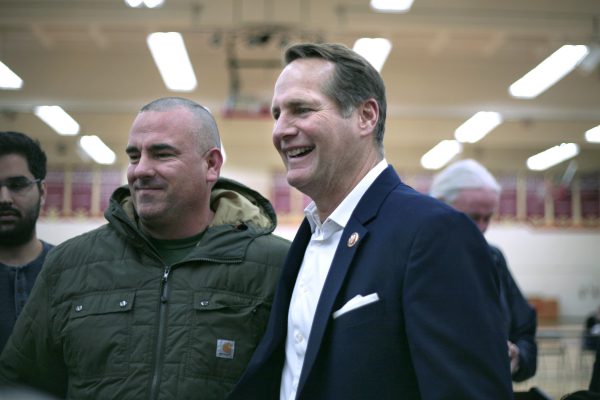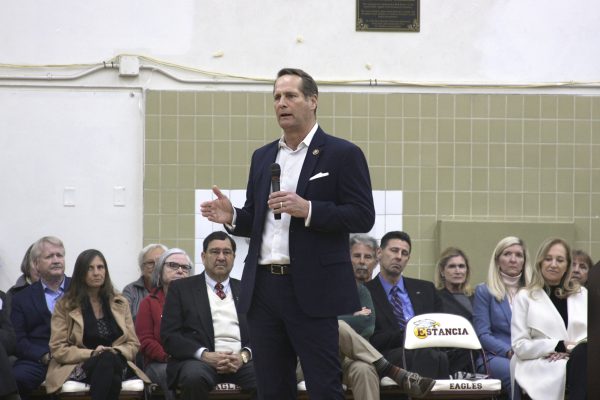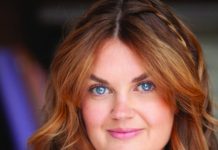By Sara Hall | NB Indy
Newly elected Congressman Harley Rouda answered a variety of questions during his first local town hall this week, including several on national issues that hit home in Laguna Beach: affordable housing, homelessness and healing the division among political leaders.
The Laguna Beach Democrat spoke to about 200 people during the event, held Tuesday at Estancia High School in Costa Mesa.
“This is what democracy looks like,” Rouda told the crowd.
He named noise and flight paths at John Wayne Airport, homelessness and housing affordability, and sober homes as a few of the key challenges in the 48th Congressional District, which includes Laguna Beach and spans Seal Beach to Laguna Niguel.
The impact of JWA is often identified as a top concern in neighboring cities.
Rouda plans on joining the Quiet Skies Caucus, which hasn’t reconvened yet for the current congress.
“We are going to address this issue,” Rouda confirmed Tuesday. “It is a horrible situation from NextGen.”
Early last year, the city of Newport Beach reached a tentative agreement with the FAA regarding flight paths. The FAA agreed that flight paths will stay between the existing noise monitors and that a “precision-based” departure procedure that follows the curves of the Upper Newport Bay will be studied and designed for JWA.
The flight patterns are impacting the quality of life for residents near the line of flight, Rouda noted.
The issue of airport noise isn’t unique to Orange County, he pointed out. A number of cities across the country are facing similar problems.
“We need to work with the FAA to figure out how to better address this through flight paths and how they take off,” Rouda said, “and the improving technology on jet engines that would help alleviate the situation and hopefully provide some incentives in the tax code…for the airlines to swap out old engines for new engines.”
Other Laguna-relevant issues Rouda mentioned involve sober living homes, homelessness, and affordable housing.
Costa Mesa, the city where the town hall was held, has more than 200 sober homes, Rouda pointed out. There doesn’t need to be that many, he added.

“What these ‘fly by night’ organizations do, they literally recruit addicts from around the country,” Rouda said.
They come to Orange County and are provided with six months of insurance benefits and less than adequate support, he said. The sober home companies then “pocket the money” and “curb them,” placing them on the street and contributing to the homelessness issue, Rouda explained.
“We’ve got to recognize (that) these are inter-related,” he said.
Overall, as part of the spending deal for fiscal year 2019, the bill provides HUD programs with more than $12 billion above the president’s request, according to the National Low Income Housing Coalition.
The spending package increases funding for homeless assistance programs to $2.64 billion and targets $80 million to address youth homelessness. The bill also provides $50 million for rapid rehousing assistance for survivors of domestic violence.
The bill also funds the U.S. Interagency Council on Homelessness at $3.6 million and extends the agency’s authorization through 2028.
Rouda addressed a number of other national issues, including healing the political division and working together. Many of Rouda’s answers returned to the idea that reaching across the aisle is the best way to move forward.

Although they may not agree, it doesn’t help anyone by “standing in your echo chamber listening only to your point of view being given back to you,” Rouda said.
“We have to do a better job as individuals to be willing to talk to each other,” he said. “Turning them off and not talking to them is not going to help you understand their viewpoint or them understand yours.”
While the extreme voices on each side get the most attention, and add to the division, most people fall somewhere in the middle. There is more that unites us than divides us, he commented.
“I believe most Americans are between the 20-yard line,” Rouda said. “What we have in common is far greater than what separates us.”
He was disappointed that there were no opportunities to interact with people on the other side of the aisle during the orientation process, the newly elected congressman noted. It was a missed opportunity.
“So myself and some like-minded freshmen Democrats and Republicans said, ‘Screw it, we’ll do it on our own.’ And we started having meetings,” Rouda said.
It’s very encouraging, he added. It takes time to build those relationships, but this is a good start.
“But there is also fear,” Rouda noted. “There’s fear that if you are publicly disagreeing with the president on any of his issues, that he’ll bring his vitriol down on you and you may not be able to do your job effectively.”
Gridlock isn’t necessarily all bad, he pointed out. They want to move forward, but they also want as much consensus as they can get from both sides. That takes time.
“That is the sausage factory of legislation,” Rouda said.
A mixture of opinions come out of a sometimes-disagreeable process. Nobody gets exactly what they want, but there is a little bit for everyone, he explained.
Rouda also answered questions about the proposed Green New Deal, universal healthcare, the border wall, gun control, his change from Republican to Independent to Democrat, voter suppression and gerrymandering, minimum wage, and more.
On his choice for 2020 democratic candidate, Rouda had an overarching goal in mind.
“Anybody that can beat Donald Trump,” he said, eliciting a loud cheer from the crowd.




